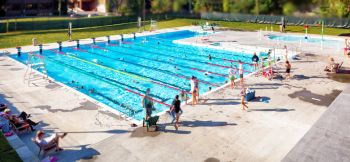How to Prepare for a Tornado & Tips to Remain Safe

A tornado is a rotating, funnel-shaped cloud with whirling winds that can be up to 300 miles per hour. Tornadoes, which spin off from powerful thunderstorms, can devastate property and neighborhoods in seconds. They can cause injury and, in some cases, be fatal for people who are caught in them. Damage paths can be one mile wide and 50 miles long.
What to Do Before a Storm
Prior to any tornado conditions occur, it is important to identify trusted sources to provide local forecast and weather alerts. A “watch” is when conditions are favorable for a tornado to form, and a “warning” is when a tornado has been spotted in your area and you should take shelter immediately.
Know the Warning Signs
If local authorities issue a tornado watch, remain alert for approaching storms, watch the sky, and stay tuned to the radio or television. Some danger signs include:
- Dark, often greenish sky
- Large hail
- A large, dark, low-lying cloud that may be rotating
- A loud roar like a freight train
Have a Plan to Seek Shelter
If local authorities issue a tornado warning, take shelter immediately. Basements and storm cellars are the best choices. If no underground shelter is available, choose an interior room or hallway on the lowest floor possible. Stay away from corners, windows, doors, and outside walls. Put as many walls as possible between you and the outside. Get under a sturdy table and use your arms to protect your head and neck. Layers of clothes, bike helmets, even a mattress, can be pulled over your head to protect you from flying debris.
Related: Prepare Commercial Properties for Tornadoes & Severe Weather
What to Do During a Tornado
If there is a tornado in your vicinity, ensuring your personal safety (and those you care for) is most important. Should you find yourself away from home and unable to put your prior shelter plan in place, here are additional tips:
- If you are in a public building, look for the safe shelter signage for predesignated areas.
- If you are in a vehicle, trailer, or mobile home, get out immediately and go to the lowest floor of a nearby, sturdy building or storm shelter.
- If you are outside with no shelter, lie flat in a nearby ditch or depression and cover your head with your hands. Do not get under an overpass or bridge — you are safer in a low, flat location.
Watch out for falling poles, overhead lines, and flying debris. Most injuries and fatalities during tornadoes are caused by flying debris. Additionally, be aware of the flooding potential and other issues. Stay safe during tornado season.


















